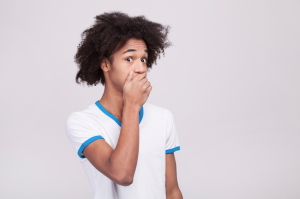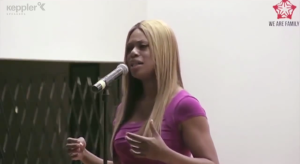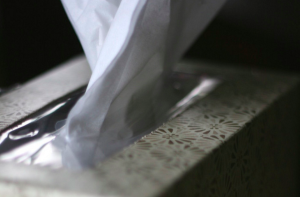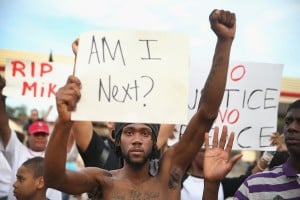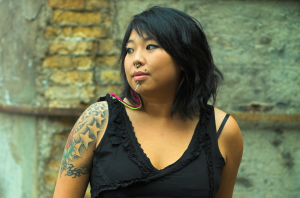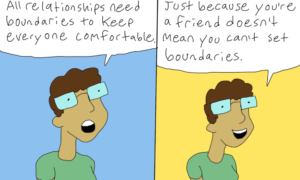Hey guys! So today, I want to talk about getting called out and how to apologize. And the thing that inspired this video is recently, we’ve had a lot of celebrities in the media screwing up, getting called out and then offering faux apologies like Russell Simmons, Paula Dean, Anthony Weiner and most recently Sheryl Underwood. I wanted to talk about what you’re supposed to do when you get called out and the way to apologize so that people believe you and know that you’re actually committed to change.
When we talk about getting called out, what exactly do I mean? It’s not just getting your feelings hurt or someone pointing at you that you took the last slice of the pizza. Getting called out in this context of this video is when you say or do something that upholds the oppression of a marginalized group of people. For example: sexism, racism, homophobia, transphobia, ableism. Something that you said or done that basically is just perpetuating negative stereotypes or ideals that have real consequences.
So, in my social responsibility video, we talked about why making jokes about really serious issues or minimizing serious issues has negative consequences. But now I wanna talk about what happens when that’s brought to your attention and how you can successfully apologize and become an ally and now be committed to changing your behavior and doing the right thing.
Usually when you call out someone’s behavior or something that they’ve said, the natural reaction is to get defensive. “You’re so sensitive!” “I was just joking.” “My best friend’s black.” “My sister’s a lesbian.” “You are so emotional!” “You know I didn’t mean it that way.” “Everybody has to be so PC nowadays.”
Now I can completely understand why people usually react this way. It’s because no one wants to be the bad guy. If you get called out on doing something that’s oppressing another group of people, well that’s bad and no one wants to be bad. But I wanna discourage you from going that route because what you really need to do is listen, because this is where the other person is hopefully gonna explain to you what you did wrong and how you can change it.
Another thing that people tend to fall back on these instances is their intent. “Oh, I didn’t mean it like that” or “You’re interpreting in the wrong way.” In these instances, I know that you might think that that makes a difference, but we’re not really worrying about your intent here because, of course, you didn’t mean to offend anyone. There really aren’t that many people that walk around trying to offend people. (I mean, there are those people and they’re jerks and why would you want to be friends with those types of people.) But your intent doesn’t really matter because it’s a matter of intent versus impact. And that’s just something that I’ve learnt from a really, good friend of mine Jukebox Jones on Facebook.
It doesn’t matter in these instances what you meant. What matters is what’s the outcome of what you said or what you did. I use this example on stepping on somebody’s foot. I might step on your foot and break your toe. I didn’t mean to break your toe, but your toe is still broken and it still really hurts. So instead of talking about what you meant to do talk about what you actually did.
Which brings me to the next part of this video: good apologies versus bad apologies. Now the first most common bad non-apology that I hear, “I’m sorry that you were offended.” That is like the worst non-apology ever because instead of taking responsibility for your actions, you’re putting the blame on the other person and saying that “it’s your fault that you’re offended,” not that you did something that offended them. So don’t make that mistake.
Another one that I hear a lot of times is “I’m sorry if you were offended.” That one doesn’t cut it either, because the person is offended, so there’s no reason to bring up “if” and it also doesn’t acknowledge what you did wrong and why it was wrong because you’re saying “If you were offended, I’m sorry, but if you weren’t offended, I’m not sorry.” And again, that’s not how you do this apology thing.
A real genuine apology is made up of two parts: the first part is you take responsibility for what you’ve done, and then the second part is you make a commitment to change the behavior. It’s that simple, and trust me, as someone that’s apologized more than a few times, as someone that’s been called out more than a few times, it’s not really that hard to do.
The best way that I can figure out to drive this point home is to give you an example using myself. So about two years ago, I made this video called “Queen For a Day” where I dressed up as a drag queen, went around New York City and asked people to guess if I was a man or a woman. I thought the video was hysterical, my friends thought it was really funny, it did really well on YouTube, and it wasn’t until about a year later that someone brought to my attention that it was super offensive! They were like “Hey, this is some transphobic garbage! Why would you do something like this?”
Now of course, my initial reaction was to get defensive, I was like “What are you talking about? I’m not transphobic, what does it even mean? I have friends that are trans! I didn’t mean it that way! It’s just a joke! You’re taking this too personally…” I did all the things that you’re not supposed to do!
So instead, I stopped and I listened. And they explained that if you’re trans, having people trying to figure out what your gender is, is like a daily battle, and it’s not really fun, and it’s super rude, and making a video that encourages that and kinda makes a game or something funny out of questioning someone’s gender is basically encouraging people to participate in that type of behavior, and that’s really, really bad, especially when you consider the fact that there are trans people who are regularly assaulted and murdered because people are trying to question and figure out how they identify.
So once this was brought to my attention, I was like…”You’re right! I’m so sorry.” Didn’t need to talk about what my intent was, or why I did it. Instead I just said, “Wow I’m really sorry. I’m really gonna make sure that I don’t do it again. Thanks for bringing that to my attention.”
I ended up taking the video down, and since then, I’ve really made an effort to be more aware of trans issues, and try to be a better ally to the trans people in my life and in my online community, and it was surprisingly not that hard or life-changing to admit that I did something wrong. And it felt really good to know that I fixed the problem, and that now I’m part of the solution.
The first thing that you wanna do is acknowledge what went wrong, and I’ll use my example of the “Queen For a Day” video. “I am sorry that I perpetuated transphobic behaviors by making a video that trivializes gender identity.” It’s a little involved, might not need to go that in depth, but you get the point.
Also, when you acknowledge what went wrong, you wanna try and make sure to avoid the words “but” or “if” because that puts conditions on your apology, or why you did it, and again, we really aren’t trying to talk about intent here.
Something that I try to do and I would love to impart on you guys when it comes to sincere apologies is to say thank you. Just a super simple, “thank you so much for bringing this to my attention.” Because it takes a lot of courage to call somebody out. It’s scary and not fun, and it’s a great way to like, soften the experience a little bit.
The last thing to remember when you’re making this apology is don’t just say it – do it. Remember that actions speak louder than words. And you can say sorry ‘til the cows come home, but if you keep engaging in that sort of behavior, or saying those sort of things, then your apology just doesn’t really mean anything.
Now that you guys know about getting called out and how to apologize, I wanna hear about a time that you had to apologize, it can be something big or small, let me know in the comments below, and don’t forget, I’m posting new videos every Friday, so make sure and subscribe, and I’ll see you guys next week. Bye!





